Links tagged "foodforthought"
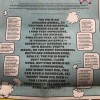
As a kid, I felt like I spent a lot of time trying to understand jokes, and what made things funny. This breakdown or dissection of a bit by Jim Gaffigan goes to the next level of helping to understand that. If I could link to the actual graphic in the New York Times, I'd do that. It doesn't appear to exist, unfortunately. #

Not that this simple blog qualifies in anyway for what Sara is talking about, but her message has stirred something in me. You know that course I developed that will teach you a computer language, and I made a bunch of videos for? You know that unique perspective I have on X, Y, or Z as I have plugged through it? I didn't think so - probably good to share some of that, in some way. Maybe you should, too. Hm. #

I've had this tab open for several months. I keep going back to a concept V.E. Schwab shares here - that there are multiple doors by which someone may enter into... anything, really. That could be fandom, or expertise, or anything else. We as people that are already in whatever group it may be, we should welcome newcomers, regardless of their path (or entry door). This is well worth the read. #

I've seen this in others, and probably in myself as well. I'm not a psychiatrist, or anybody qualified to share medical opinions, but I'm not convinced depression is a chemically-induced situation in all cases. This article is good to keep in mind for me and others. It'd probably be interesting to read his book. #

Worth reading every word of this article. A fascinating and sad view into something I was completely oblivious to. I'm so glad I read this. #
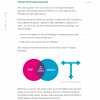
Charlie Munger, Warren Buffet's business partner of over 40 years, takes an intentional wide and deep approach to learning, which has obviously been highly (financially) beneficial. A couple highlights from the article:
Bill Gates has said of Munger, “He is truly the broadest thinker I have ever encountered. From business principles to economic principles to the design of student dormitories to the design of a catamaran he has no equal… Our longest correspondence was a detailed discussion on the mating habits of naked mole rats and what the human species might learn from them.” Munger has, in short, been the ultimate expert-generalist.
He gives a basic definition of what an Expert Generalist is as:
“Someone who has the ability and curiosity to master and collect expertise in many different disciplines, industries, skills, capabilities, countries, and topics., etc. He or she can then, without necessarily even realizing it, but often by design:
- Draw on that palette of diverse knowledge to recognize patterns and connect the dots across multiple areas.
- Drill deep to focus and perfect the thinking.”
I admired a friend in high school, because it seemed that he could have conversations about all sorts of things with all sorts of people. Munger's style reminds me of him. I really like the intentional approach to this style of learning, and would claim to be trying a version this approach, personally. The full article is certainly worth reading, despite the (real) click-bait title. #
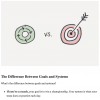
I frustrate my direct supervisor at work, in part because I hate goals, and I verbalize my disapproval of them. My nuanced feelings about goals and the deadlines frequently associated with them can't fit into an entry like this. That said, I agree with a lot of what James Clear has to say about goals. One of those that has bitten our team most recently is this shortcoming of goals:
You can’t predict the future. (I know, shocking.)
But every time we set a goal, we try to do it. We try to plan out where we will be and when we will make it there. We try to predict how quickly we can make progress, even though we have no idea what circumstances or situations will arise along the way.
Really though, you should read the whole article. It's well-written, and I'm curious to read his newsletters going forward. #
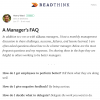
Henry Ward has some interesting responses to some of these questions, and not all of them do I agree with. Regardless, I most liked the non-abbreviated answers he gave to the following questions:
- How do I get employees to perform better?
- How do I give negative feedback?
- When do I fire somebody?
- Why can’t I just tell people what to do?
SPOILER ALERT! Here are the abbreviated answers he gives to those questions:
- Tell them what they are doing well.
- By being curious.
- When you know they can’t succeed.
- Because the more responsibility you have, the less authority you have. #
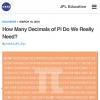
A fascinating insight into why NASA's Jet Propulsion Laboratory only uses pi to the 15th decimal place (3.141592653589793). I like the second example the most:
We can bring this down to home with our planet Earth. It is 7,926 miles in diameter at the equator. The circumference then is 24,900 miles. That's how far you would travel if you circumnavigated the globe (and didn't worry about hills, valleys, obstacles like buildings, rest stops, waves on the ocean, etc.). How far off would your odometer be if you used the limited version of pi above? It would be off by the size of a molecule. There are many different kinds of molecules, of course, so they span a wide range of sizes, but I hope this gives you an idea. Another way to view this is that your error by not using more digits of pi would be 10,000 times thinner than a hair!
Given this perspective, it makes you wonder why things like this exist. ("Because we can!" Uh huh.) #

John Hull, a writer and theologian, became completely blind in 1983. He kept a diary on an audiocassette. This film is a dramatization of some of of his words and thoughts. I loved it, and feel like it's a shame I didn't see it closer to its original release. I'm going to eagerly devour the story and additional material behind it. #









